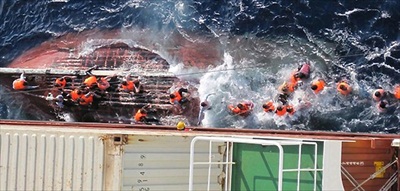At-a-glance:
- This news is regarding boat capsizing tragedy on June 21, 2012
- It is believed there were 214 men on the boat – 210 were from Afghanistan, Pakistan, and Iran and four were Indonesian crew members. T
here were 110 men rescued, 17 bodies were recovered and 87 are still missing presumed drowned.
Total died stands at: 104
- Boat name: Kaniva or the SIEV 358 on June 21 last year
- Australian Maritime Safety Authority (AMSA) received 16 distress calls for over two days before eventually capsizing, killing 104 men.
- The boat first called AMSA on June 19, saying that it was overloaded with passengers, they did not have any lifejackets and the boat was damaged and taking on water.Despite the call AMSA determined the boat was not in distress. The details in the classified report emerged during the court proceedings while AMSA manager Alan Lloyd was giving evidence about Australia’s response to the boat’s calls for help. Mr Lloyd said AMSA was in dispute with Customs over sections of the report and had “unsuccessfully” tried to have more input into its findings.
- Source: Sydney Morning Herald Investigation
Relevant News:
- Request for Information: Inquest into the deaths at sea on 21 June 2012 by Marco Tedeschi, a barrister based in Perth – May 22, 2013
- The Sydney Morning Herald: Rescuers fear 90 drowned in asylum tragedy – June 22, 2012
On 21 June 2012 a boat carrying refugees on the 6,000-mile journey from Pakistan to Australia sank with the loss of 94 lives. The Guardian spoke to the survivors and tells the story of international criminal networks and a web of corruption across the far east. Their accounts reveal the plight of desperate refugees forced to pay exorbitant sums.
21 June 2012
There was almost no warning. The boat had stopped about 10 minutes earlier. Since then it had rocked gently in the swell, settling lower in the water. Its Indonesian crew shouted to one another, increasingly agitated.
On the roof of the open wooden outsize fishing boat, Mohammed Ishaq was shaken awake by another refugee. “Get up, the boat is sinking,” he was told. But even as he stood, the 31-year-old Afghan-born Pakistani felt the deck tilting sharply under his feet. He slid, fell and hit the water.
It was 21 June 2012. The boat was 107 nautical miles from the nearest land. Of the 204 refugees aboard, almost all from Afghanistan or Pakistan, 94 would die.
It was one of the worst of the growing number of sinkings involving illegal immigrants attempting the 6,000-mile journey to Australia from Pakistan and Afghanistan. Only now can the full story be told.
On one level it involves thousands of men, women and children, transnational criminal networks, tens of millions of dollars and a corroding web of corruption across the far east and further afield. On another, it means hundreds of drowned fathers, brothers, sons, daughters, mothers and babies, and thousands of bereaved relatives.
Only a week before Ishaq was plunged into the water, 93 died when another boat making its way to Christmas Island had sunk. There have been many more shipwrecks since, Afghan community representatives in Australia say, in which around 300 men, women and children have drowned. There are others which go unreported. Up to 600 have died in the past two or three years, they say, though they point out that the true figure is impossible to know.
This summer thousands more will attempt the perilous journey.
Officials from the governments of Pakistan, from where most of the refugees come, and of Indonesia, through which most of the refugees transit, privately admit they cannot stem the flow. Australia is trying to discourage prospective asylum seekers with new laws, offshore processing centres and with offers to take more refugees who choose to enter the country legally. But such measures appear to have little impact. The only barriers currently are natural – not man-made.
Ishaq’s story
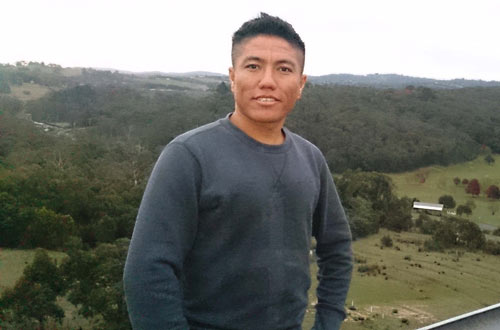
Ishaq’s story is typical. The 31-year-old comes from the seething Pakistani port city of Karachi, where his family have lived since emigrating from a rural area of central Afghanistan 25 years ago. He grew up in the middle class Gulshan-e-Iqbal neighbourhood, happy to be away from his turbulant homeland. Years in school and college passed without incident. Then, shortly after his marriage, security in the city began to deteriorate rapidly. Ishaq became a target.
Like most of the refugees with him on the boat, Ishaq was a Hazara, an ethnic minority in Afghanistan and Pakistan whose distinctive features and devotion to the Shia strand of Islam in countries dominated by Sunni Muslims has long meant marginalisation. But in Karachi, and the western city of Quetta where a large Hazara community is based, discrimination has turned deadly.
In both cities squads of Sunni militants have begun attacking Shias, and particulary Hazaras. The violence has intensified each month. Two of Ishaq’s relatives were shot, one paralysed from the waist down. Ishaq himself received threats. In late 2011, he decided, reluctantly, he had to leave. “Of course I didn’t want to go. I had my family, my wife, my business [a corner shop]. But I had no choice,” he told the Guardian.
Ishaq chose Australia because it was the “only country” he knew “that was accepting refugees”. Getting to western Europe was too dangerous. Other states in the region did not offer asylum. In Australia, Ishaq knew too he would find friends and relatives amid the growing Hazara community.
Friends in Quetta put Ishaq in touch with “people” who could organise his trip. He would pay in instalments, with $4,000 paid up front to reach Malaysia and then another $3,000 to get from there to Indonesia. He said goodbye to his parents and wife and left in the first week of 2012, on a plane to Kuala Lumpur. That year, 320 Shia Muslims were killed in Pakistan.
Ali Hasaan Kaka
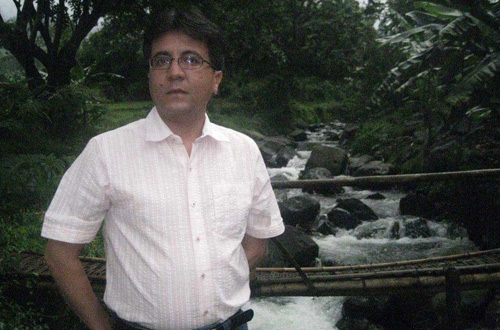
In Quetta itself, another family was bracing itself for separation. Ali Hasaan Kaka, a 38-year-old bank clerk with a love for Hazaran cooking and practical jokes, and his 32-year-old cousin, Imran, were spending a last evening at dinner with their extended family, his sister in law remembers. The pair had paid $14,000 to an agent for the trip. “We all ate together and chatted a lot about what future may hold for us. Ali hoped that after a few month in Australia, all of us will go there. My sister was scared at his idea of leaving Pakistan in such a risky manner but encouraged him to go in search of greener pastures,” she told the Guardian.
To the north, high on the Pakistani border with Afghanistan, dozens of other young men were also preparing to depart for Australia. They too were Hazaras, living in Parachinar, a remote, rough town in the volatile semi-autonomous tribal agency of Kurram. Here too sectarian violence was intense. A report by the Pakistani federal investigation agency seen by the Guardian, describes a meeting in September 2011. Five men from Kurram travelled to Islamabad, the capital of Pakistan, for a meeting with an agent. Between then and January 2012, the men paid a total of over $90,000 to the agent for sending 10 of their sons, cousins and brothers to Australia “for work”. One was Abdul Aziz, a 45-year-old illiterate labourer and father of five.
“Seeing the persecution of Shias in our city, he borrowed $10,000 and left for Thailand en route to Australia,” his brother-in-law said in a telephone interview from Parachinar.
The agent, investigators in Pakistan say, ran the westernmost end of a massive operation with contacts all the way to Australia. They called it the Tajir Travel Agency, after the shop in the frontier city of Peshawar which acted as a front office for the network.
Malaysia to Indonesia
When Ishaq arrived at Kuala Lumpur airport he bought a sim card and called a number he had been given by traffickers in Karachi. Within an hour, a Malaysian man linked, according to the Pakistani report, to the Tajir Travel Agency, had picked him up. The agency’s key operator here was from the Pashtun tribes along the Afghan-Pakistan frontier, the Pakistani investigators say. After a night alone in a house in the Malaysian capital, Ishaq was joined by a dozen other Hazaras who had followed an identical path.
Back home, his family paid another $3,000 to their contact and a week later, the group were driven to a beach three hours from Kuala Lumpur. They boarded a boat and, after four hours on calm seas at night, landed in Indonesia. Taken to an airport, they then flew to Jakarta. With no visas, they went underground in a private home in the city of Bogor nearby.
Ishaq’s parents had trouble finding the $5,000 needed for onward travel. He stayed in the house for five months, sleeping with up to a dozen others in two rented rooms.
Eventually, after five months, his family wired the dollars. Then his contact with the network called. Get to a shopping centre in Jakarta, she said. At the mall, dozens of other young Afghan and Pakistani men were waiting. Another call directed him to take a taxi to a new address – a bus stand. Four coaches were loaded with 200 young Afghan men and driven into the night.
Among the refugees on the buses that night were Ali Hasaan Kaka, the former banker who had left Quetta to seek “greener pastures” two months earlier, and his cousin. Kaka had made a final call home. “He spoke to my sister from Indonesia, saying, ‘Please don’t be worried if my phone does not work as we will be leaving for Australia very soon.’ We all were nervous and happy at the same time,” his sister-in-law remembered
The fact that a convoy carrying 200 or more men without visas could drive across the crowded centre of Java even at night indicates that local security forces had been paid off, said one western official based in Indonesia.
The man organising the onward travel of Ishaq and the others, according to evidence heard in an Indonesian court, was Dawood Amiri, an ethnic Hazara who, like his clients, had fled Pakistan and come to Indonesia hoping to cross to Australia before being detained a year before. On his release, prosecutors said, he had become a significant “second-rank” player in the trafficking business and had organised three previous sailings, without incident. He was the local representative of the Tajir Travel Agency.
Western investigators working on trafficking say that such “franchises” are common. Refugees heading from Asia to Europe are passed from network to network, each a separate organisation. But in the far east the networks are more integrated, acting as a “courier system” through which “packages” – people – can be moved along chains of trusted intermediaries. In each location, local representatives develop the relationships with the authorities that are needed to smooth the way.
Though much larger sums went to higher officials to allow entry of refugees at airports or in return for information about planned anti-trafficking operations, Amiri told investigators, each police checkpoint on the 150-mile drive across Java required a bribe of $200 or more.
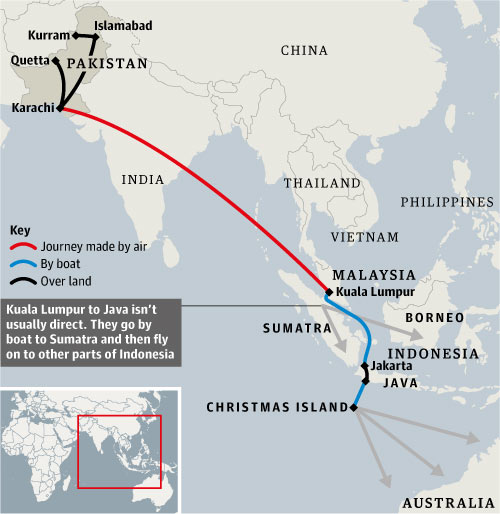
At sea
With local authorities take care of, the refugees reached a beach on the south coast of Java at around midnight. There were smaller boats waiting to take them to a larger vessel, miles offshore. As they approached the boat that was supposed to take them to Christmas Island, Ishaq knew that his worst fears had been realised.
“There were men everywhere, all over the deck, shouting to us to go back, that there was no space, that the boat would sink, that we would drown,” he remembered. “I was terrified. But how could we go back?”
Pushed aboard by the press of men behind him, he fought his way through the crowd and grabbed one of the last life jackets. “The old and the weak were pushed aside,” he remembered. The traffickers had taken his mobile phone. He had just his clothes, passport, wallet and a few hundred dollars.
At dawn, the ship got under way. The refugees saw a few fishing boats. Then nothing. The few bottles of water, supply of tinned cheese and bags of dry noodles on board were grossly inadequate for 200 men for a five or six-day journey.
One of the refugees on the boat was Abdul Aziz, the Parachinar labourer with five children. After three days at sea, he used the crew’s single satellite phone, to call home.
“He spoke to us from the boat on 21 June,” his brother-in-law said. “He said, ‘We are leaving for Australia and I will call you from there.’ When he spoke to his only daughter, then six years old, he promised to bring her dolls and clothes.”
But that night a crew member fell asleep and allowed the engine and the pumps to run out of fuel. The hold of the leaky, overburdened boat rapidly filled with water.
“It happened very fast. The boat just capsized. Everyone went in the water. People were very scared and shouting, trying to grab each other, fighting and sinking and pulling each other down,” Ishaq said.
It was around 2am and very dark. There were no life rafts, and only half the refugees had managed to grab one of the worn-out life belts heaped in the boat’s hold.
Though 30 or 40 people managed to clamber on to the hull, the rest were left in the waves. Almost none could swim. Ishaq, treading water, tightened the strings on his own life jacket as a current drew him away.
“I thank God there were no women or children on the boat, just young men and teenagers,” he said.
After a few hours, the strings on his lifejacket parted. He held it with one hand and swam with the other. Bodies floated on the water. Men shouted to each other, then their voices faded as they sank beneath the waves. “We prayed and cried and tried to encourage each other. They died before my eyes. My own hopes were fading,” he said.
After nearly 24 hours in the water, a plane flew low overhead, but dropped a raft full of supplies too far away for the exhausted refugees. A second aircraft dropped an inflatable tube. Ishaq hung on to it. An hour later an Australian naval vessel picked up survivors and took them Christmas Island.
“I was looking for my friends but there were so few of us. So many had drowned,” he said. Among them was the food-loving banker Ali Hasaan Kaka, his cousin, and Ali Abdul Aziz, the labourer from Parachinar.
A week later, another boat would sink, this time with the loss of about 65 asylum-seekers. During the last days of August, about 100 heading to Christmas Island may have drowned in two incidents. Other boats have simply disappeared. More than 200 died in March when another vessel sank, according to reports in Pakistan. Last month news reached Quetta and Parachinar of another shipwreck in which about 60 died.
Aftermath
The only good news is that the Tajir Travel Agency network has been wound up. One member, a Pakistani policeman, was arrested in Quetta. Four others were picked up a genteel neighbourhood on the outskirts of Islamabad last month. They confessed to receiving £700,000 from their clients. Investigators told the Guardian this figure was a fraction of the total.
Two other members of the network were detained in Indonesia. One, Dawood Amiri, who organised the 21 June sailing, was sentenced in February to six years in prison. When he was arrested 84 mobile phones were found in his possession, taken from the refugees.
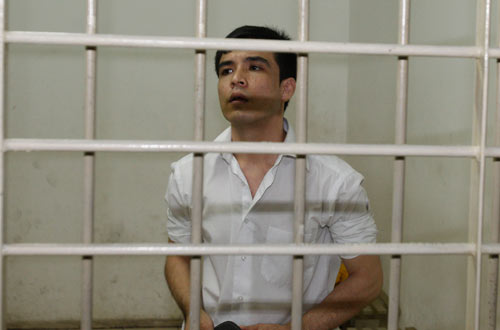
Kaka’s family learned about the shipwreck from local newspapers. “None of us believed it initially. Now that we … don’t talk about it within the family,” Kaka’s sister-in-law said. “His fiancee, my sister, has been extremely depressed but is now improving a bit. My father has now understood that Kaka is gone but won’t talk to anyone about him at all.”
The consequences for Abdul Aziz’s large family have been severe. With the only wage earner gone, his eldest son had left school and works in a bakery. His house is to be sold to pay off debts.
“We have no plan for life ahead,” said Abdul Hussein, his brother in law, “I cannot look in the eyes of my sister, even now a year after he left. I don’t blame him. My own 16 year old son was shot dead in a sectarian killing shortly after Abdul Aziz was drowned.”
Ishaq, the survivor, is unsure what advice he would give to those planning their own bid to reach Australia. “If your life is safe and you have a choice then don’t do it, it isn’t worth the risk,” Ishaq said. “But if you have no alternative …”
Additional reporting: Naveed Ahmad, Islamabad
[ Full Story: The Guardian, UK ]
admin
Latest posts by admin (see all)
- ISIS claims gruesome murder of 10 Hazara coalminers in Pakistan - January 5, 2021
- Farewell Hussain Babai - December 20, 2020
- Hazaras categorically reject US-engineered ‘Taliban talks’ in Qatar - September 12, 2020
